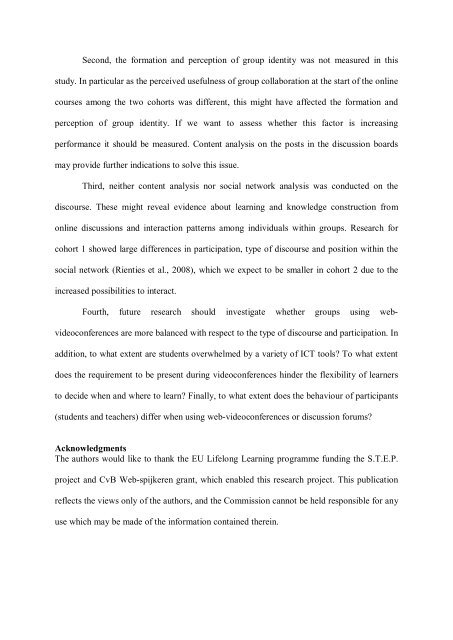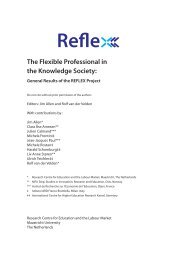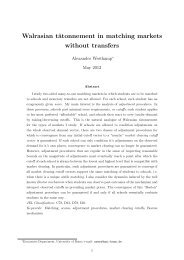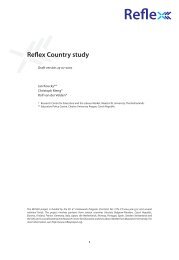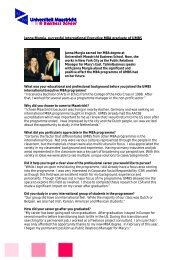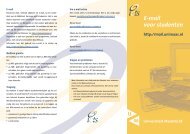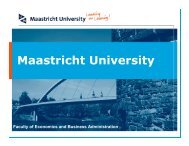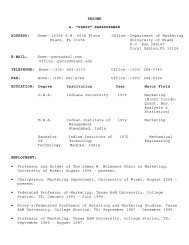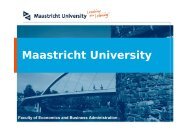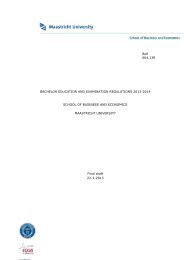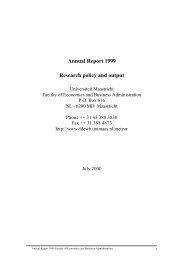Second, the formation <strong>and</strong> perce<strong>pt</strong>ion <strong>of</strong> group identity was not measured in this study. In particular as the perceived usefulness <strong>of</strong> group collaboration at the start <strong>of</strong> the online courses among the two cohorts was different, this might have affected the formation <strong>and</strong> perce<strong>pt</strong>ion <strong>of</strong> group identity. If we want to assess whether this factor is increasing performance it should be measured. Content analysis on the posts in the discussion boards may provide further indications to solve this issue. Third, neither content analysis nor social network analysis was conducted on the discourse. These might reveal evidence about learning <strong>and</strong> knowledge construction from online discussions <strong>and</strong> interaction patterns among individuals within groups. Research for cohort 1 showed large differences in participation, type <strong>of</strong> discourse <strong>and</strong> position within the social network (Rienties et al., 2008), which we expect to be smaller in cohort 2 due to the increased possibilities to interact. Fourth, future research should investigate whether groups using web- videoconferences are more balanced with respect to the type <strong>of</strong> discourse <strong>and</strong> participation. In addition, to what extent are students overwhelmed by a variety <strong>of</strong> ICT tools? To what extent does the requirement to be present during videoconferences hinder the flexibility <strong>of</strong> learners to decide when <strong>and</strong> where to learn? Finally, to what extent does the behaviour <strong>of</strong> participants (students <strong>and</strong> teachers) differ when using web-videoconferences or discussion forums? Acknowledgments The authors would like to thank the EU Lifelong Learning programme funding the S.T.E.P. project <strong>and</strong> CvB Web-spijkeren grant, which enabled this research project. This publication reflects the views only <strong>of</strong> the authors, <strong>and</strong> the Commission cannot be held responsible for any use which may be made <strong>of</strong> the information contained therein.
References Anderson, T., Rourke, L., Garrison, D., & Archer, W. (2001). Assessing teaching presence in an computer conferencing context. Journal <strong>of</strong> Asynchronous Learning Networks, 5(2), 1-17. Arts, J. A., Gijselaers, W. H., & Segers, M. (2006). From cognition to instruction to expertise: measurement <strong>of</strong> expertise effects in an authentic, computer supported, <strong>and</strong> problem-based course. European Journal for Psychology <strong>of</strong> Education, 21(1), 71-90. Beers, P., Boshuizen, H., Kirschner, P. A., & Gijselaers, W. H. (2005). Computer support for knowledge Construction in collaborative learning environment. Computers in Human Behaviour, 21, 623-643. Beers, P., Boshuizen, H., Kirschner, P. A., & Gijselaers, W. H. (2007). The analysis <strong>of</strong> negotiation <strong>of</strong> common ground in CSCL. Learning <strong>and</strong> Instruction, 17(4), 427-435. Bromme, R., Hesse, F. W., & Spada, H. (Eds.). (2005). Barriers <strong>and</strong> Biases in Computer-Mediated knowledge communication <strong>and</strong> how they may be overcome (5 ed.). New York: Springer. Caspi, A., & Blau, I. (2008). Social presence in online discussion groups: testing three conce<strong>pt</strong>ions <strong>and</strong> their relations to perceived learning. Social Psychology <strong>of</strong> Education, 11(3), 323-346. Cohen, J. (1998). Statistical power analysis for the behavioral sciences (2nd ed.). Hillsdale, NJ: Lawrence Earlbaum Associates. De Laat, M., Lally, V., Lipponen, L., & Simons, R.-J. (2007). Online teaching in networked learning communities: A multi-method approach to studying the role <strong>of</strong> the teacher. Instructional Science, 35(3), 257-286. Derks, D., Bos, A. E. R., & Grumbkow, J. v. (2007). Emoticons <strong>and</strong> social interaction on the Internet: the importance <strong>of</strong> social context. Computers in Human Behavior, 23(1), 842-849. Dochy, F., Segers, M., Van den Bossche, P., & Gijbels, D. (2003). Effects <strong>of</strong> problem-based learning: a metaanalysis. Learning <strong>and</strong> Instruction, 13(5), 533-568. Haythornthwaite, C. (2000). Online Personal Networks: Size, Composition <strong>and</strong> Media Use among Distance Learners. New Media & Society, 2(2), 195-226. Hmelo-Silver, C. (2004). Problem-Based Learning: What <strong>and</strong> How Do Students Learn? Educational Psychology Review, 16(3), 235-266. Jonassen, D., H., & Kwon, H. (2001). Communication patterns in computer mediated versus face-to-face group problem solving. Educational Technology Research <strong>and</strong> Development, 49(1), 35-51. Kirschner, P. A., Strijbos, J.-W., Kreijns, K., & Beers, P. (2004). Designing electronic collaborative learning environments. Educational Technology Research <strong>and</strong> Development, 52(3), 47-66. Mehrabi, A., Gluckstein, C., Benner, A., Hashemi, B., Herfarth, C., & Kallinowski, F. (2000). A new way for surgical education -- development <strong>and</strong> evaluation <strong>of</strong> a computer-based training module. Computers in Biology <strong>and</strong> Medicine, 30(2), 97-109. Rehm, M. (2009). Unified in Learning – Separated by Space; Case Study on a Global Learning Programme. Industry <strong>and</strong> Higher Education, X(X), XX-XX. Rienties, B., Tempelaar, D. T., Van den Bosche, P., Gijselaers, W. H., & Segers, M. (2008). Students’ motivations <strong>and</strong> their contributions to virtual learning. Paper presented at the ICLS, Utrecht. Rienties, B., Tempelaar, D. T., Waterval, D., Rehm, M., & Gijselaers, W. H. (2006). Remedial online teaching on a summer course. Industry <strong>and</strong> Higher Education, 20(5), 327-336. Rogers, P., & Lea, M. (2005). Social presence in distributed group environments: the role <strong>of</strong> social identity. Behaviour & Information Technology, 24(2), 151-158. Rourke, L., Anderson, T., Garrison, D., & Archer, W. (2001). Assessing Social Presence In Asynchronous Textbased Computer Conferencing Journal <strong>of</strong> Distance Education, <strong>14</strong> (3), 51-70. Rummel, N., & Spada, H. (2005). Instructional support for collaboration in desktop videoconference settings. In R. Bromme, Hesse, F.W., & Spada, H. (Ed.), Barriers <strong>and</strong> Biases in Computer-Mediated knowledge communication <strong>and</strong> how they may be overcome (5 ed., pp. 59-84). New York: Springer. Schellens, T., & Valcke, M. (2006). Fostering knowledge construction in university students through asynchronous discussion groups. Computers & Education, 46(4), 349-370. Tu, C. (2002). The measurement <strong>of</strong> social presence in an online learning environment. International Journal on E-Learning, 1(2), 34-45. Tu, C., & McIsaac, S. M. (2002). The Relationship <strong>of</strong> Social Presence <strong>and</strong> Interaction in Online Classes. American Journal <strong>of</strong> Distance Education, 16(3), 131-150. Valler<strong>and</strong>, R. J., Pelletier, L. G., Blais, M. R., Brière, N. M., Senécal, C., & Vallières, E. F. (1992). The academic motivation scale: A measure <strong>of</strong> intrinsic, extrinsic, <strong>and</strong> amotivation in education. Educational <strong>and</strong> Psychological Measurement, 52, 1003–1017. Van den Bossche, P., Gijselaers, W. H., Segers, M., & Kirschner, P. A. (2006). Social <strong>and</strong> cognitive factors driving teamwork in collaborative learning environments. Team learning beliefs & behaviour. Small Group Research, 37, 490-521.


